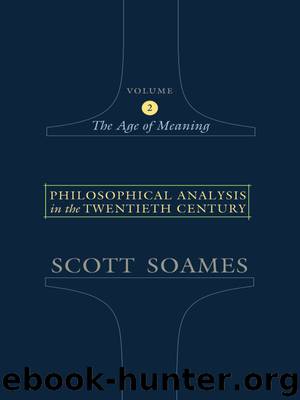Philosophical Analysis in the Twentieth Century, Volume 2 by Soames Scott;

Author:Soames, Scott;
Language: eng
Format: epub
Publisher: Princeton University Press
Published: 2008-02-18T16:00:00+00:00
Evaluating Quine’s Case for Indeterminacy
What should we say about this argument? The first point to make is that the contents of the premises and conclusion are unclear. In particular, it is unclear precisely what determination relation is invoked in the doctrines of physicalism, the underdetermination of translation by physics, and the indeterminacy of translation. (This is something that, like Quine himself, I have skirted up to now.) Unfortunately, Quine never satisfactorily clarifies this. There are, however, several possibilities for spelling out what determination amounts to, and because of this, there is a danger of equivocation. In what follows, I will suggest that there are interpretations of the determination relation on which physicalism is plausible and interpretations on which the underdetermination of translation by physics is plausible, but there is no interpretation on which both physicalism and the underdetermination of translation by physics are plausible, and hence no interpretation on which the argument for the indeterminacy of translation can be sustained.
Let’s look. What is it for one set of claims to determine another? It is not for the claims in the second set to be logical consequences of the claims in the first. Certainly, translation theories are not logical consequences of the set of all physical truths. But this is trivial, since whenever an empirical theory of any interest includes vocabulary not found in the truths of physics, it will fail to be a logical consequence of those truths. For example, not all the truths of biology are logical con-sequences of the set of true sentences of the language of an ideal physics. But biology is supposed by Quine to be determined by physics; so the determination relation cannot be that of logical consequence. If it were, physicalism would be self-evidently false.
Let us examine a different conception of the determination relation. Someone might say that a set P of claims determines a set Q iff it is in principle possible, given the claims in P, for one to demonstrate the truth of the claims in Q, appealing only to logic and obvious apriori principles or definitions. The idea here is that for P to determine Q is for P to provide a theoretical basis for establishing Q that is absolutely conclusive, and that rules out any possibility of falsehood. In effect, determination is here construed as apriori consequence.
On this interpretation, the underdetermination of translation by physics is both interesting and plausible. Given the total set of behavioral evidence about stimulus meanings of the sort Quine identifies, I cannot absolutely establish that what a speaker means by one of his terms is what I now mean by ‘rabbit’, as opposed to what I now mean by ‘undetached rabbit part’ or ‘temporal stage of a rabbit’. The claim that a speaker means one of these things rather than another is not an apriori consequence of the total set of claims about Quinean stimulus meanings. Moreover, it is hard to see how additional behavioral facts or physical facts—about neurological events in our brains or
Download
This site does not store any files on its server. We only index and link to content provided by other sites. Please contact the content providers to delete copyright contents if any and email us, we'll remove relevant links or contents immediately.
The remains of the day by Kazuo Ishiguro(8965)
Tools of Titans by Timothy Ferriss(8360)
Giovanni's Room by James Baldwin(7316)
The Black Swan by Nassim Nicholas Taleb(7099)
Inner Engineering: A Yogi's Guide to Joy by Sadhguru(6784)
The Way of Zen by Alan W. Watts(6591)
Asking the Right Questions: A Guide to Critical Thinking by M. Neil Browne & Stuart M. Keeley(5751)
The Power of Now: A Guide to Spiritual Enlightenment by Eckhart Tolle(5742)
The Six Wives Of Henry VIII (WOMEN IN HISTORY) by Fraser Antonia(5493)
Astrophysics for People in a Hurry by Neil DeGrasse Tyson(5172)
Housekeeping by Marilynne Robinson(4434)
12 Rules for Life by Jordan B. Peterson(4298)
Double Down (Diary of a Wimpy Kid Book 11) by Jeff Kinney(4257)
The Ethical Slut by Janet W. Hardy(4240)
Skin in the Game by Nassim Nicholas Taleb(4232)
Ikigai by Héctor García & Francesc Miralles(4232)
The Art of Happiness by The Dalai Lama(4120)
Skin in the Game: Hidden Asymmetries in Daily Life by Nassim Nicholas Taleb(3986)
Walking by Henry David Thoreau(3950)
